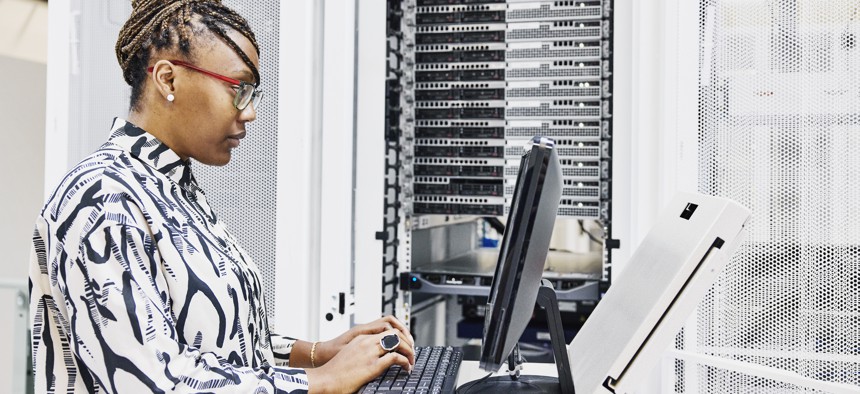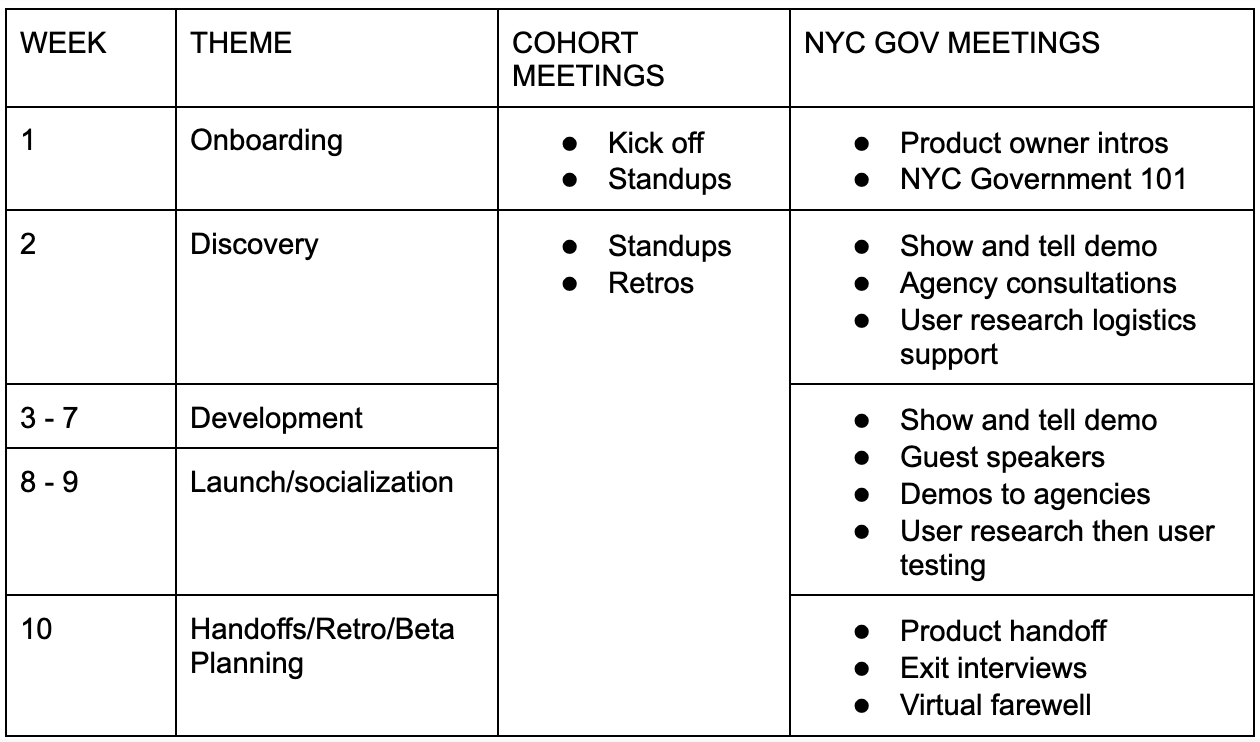Demonstrating Digital Government

Thomas Barwick via Getty Images
COMMENTARY | Digital work is ultimately change work and requires adapting systems, people, processes and services.
This is part three of a three-part “Digital Government 101” series, showcasing the work of New York City's Office of Technology and Innovation, shared in partnership with the Beeck Center for Social Impact + Innovation at Georgetown University. The Beeck Center and the U.S. Digital Response are coordinating a new peer learning network for people working in digital government, the Digital Service Network. The DSN is a growing network that connects and supports digital service teams and professionals so government is responsive, open, and accessible to everyone. The insights in this series are from presentations by Katherine Benjamin, the deputy chief technology officer for digital services in the Office of Technology and Innovation and Alexis Wichowski, the office's deputy chief technology officer for inclusive innovation. You can find all of the articles in this series here.
***
Digital service teams work to improve numerous touch points across hundreds and thousands of services offered by individual cities, states and counties each day. But an underinvestment in roles with modern digital skills, limited resources and broken systems, like hiring and procurement, means governments have limited capacity to implement digital transformation.
As a result, digital service teams have begun to rely on fellows, volunteers and other temporary staffing methods to boost capacity and do necessary work. But effectively tapping and managing temporary capacity can be difficult. New York City’s Digital Government 101 provides a valuable framework that helps fellows transition to work within the government structure. Similarly, this framework can also be used by government organizations with employees that wish to adopt more agile ways of providing services.
Digital service work processes are a way to introduce change management and new ways of doing work to an organization. By demonstrating different, more modern ways of working, digital service work helps to create new precedents and can divorce risk, liability and fear from the process. By digitally transforming touch points, like an application or form, new ways of working can be introduced that lead to greater change for larger services and systems.
Digital work is ultimately change work, and requires adapting systems, people, processes and services. The digital government enthusiasts who have the most impact are those who adopt a mindset of curiosity and seek to understand the cultures, processes and practices beyond technology.
Whether you have a fellows program like New York, or wish to pursue digital innovation with existing staff, the linear planning and development model is a way for government agencies and fellows or volunteers to communicate about de-risking technology projects because it provides boundaries for projects that are on short timelines and provides milestones for partners. De-risking is the thoughtful process of taking steps to make something less risky or less likely to involve a financial loss.
“Value cannot be created until work is put in the hands of users. Get Minimum Viable Product ASAP.” – Katherine Benjamin
Linear Planning and Development
The linear “Discovery, Alpha, Beta, Live” framework also breaks work into manageable chunks and allows the office to demonstrate the value of each phase of work. There is limited time, so the team emphasizes getting prototypes and products in the hands of partners as soon as possible. Below is the process to help structure the work.
To make change, talking with partners to provide them the support for digital transformation is important. This will traditionally happen through small steps like user research and testing. The New York Office of Technology and Innovation practices agile processes, which focuses on a product mindset with ongoing testing and iteration to make sure that value is released with each iteration of the product.

Pre-Discovery
The purpose of the pre-discovery phase is to identify projects, engage partners and scope the work.
Discovery
At the national level, digital service organizations like 18F have used discovery — or the process of understanding users and their needs by collecting information — to de-risk technology investments. This stage most commonly involves working with partners to consider how digital work can be maintained after the fellows complete their engagement.
This process also helps the team to understand what resources and roles are needed during the project so that the product is sustainable. In the discovery phase the team identifies, defines and scopes problems that users are experiencing, which in turn ensures that whatever solution is implemented or built actually addresses user’ and partner’ problems.
Alpha and Beta
“Start with user needs. Embrace the sacrificial prototypes, design provocations, and testing hypotheses.” – Katherine Benjamin
The alpha and beta phases help partners break down larger projects into smaller steps and forces partners to prioritize work. Prototypes are built and iterated on and demos are shared with partners to descope work, so that the focus is on needed features that will provide the most value.
Alpha and beta model best practices, demonstrate cost-saving approaches and reduce the amount of risk partners take on when making digital investment decisions. The project is broken into sprints, onboarding, discovery, development, launch and handoffs. Each of those sprints have three types of meetings:
- Kickoff: Fellows receive an overview of doing digital work in government and are introduced to their respective projects and product owners.
- Stand-ups: Fellows meet with their team members to give updates, identify blockers, and plan upcoming work.
- Retros: Fellows provide updates to agency partners on their findings, show the work that is being done, and communicate next steps.
Below is the timeline provided to NYC[x] Innovation Fellows at the beginning of their onboarding process.

Live and Beyond
In traditional software development, once a beta version has been released to users and the product is scaled, developers move into the live phase, during which they are responsible for sustaining the infrastructure and continuing to iterate and make changes. In this stage in the NYC[x] Innovation Fellows program, products are handed off to partners, and work is done with partners to help maintain, scale or further develop the product.
Ultimately, this process provides a framework for partners, modeling modern digital best practices. Working this way also allows partners to try out new processes without devoting a large amount of resources, limiting potential liability.
About the Author:
Sarah Rodriguez is a Digital Services team researcher for the Beeck Center for Social Impact + Innovation at Georgetown University. She previously was a systems and data designer for the Center for Excellence and Innovation at the city of Austin and was previously a Bloomberg i-team fellow at the city’s Innovation Office. She has worked on a number of projects, including service access, digital transformation, homelessness and equity in policing technology.
About the Digital Service Network:
The Digital Service Network (DSN) connects and supports digital service teams and professionals so government is responsive, open and accessible to everyone. Join the DSN mailing list today and help us build a collaborative network of digital government leaders and best practices. DSN peer learning is supported by the Beeck Center for Social Impact + Innovation at Georgetown University, and the US Digital Response.
About the Beeck Center for Social Impact + Innovation:
The Beeck Center for Social Impact + Innovation at Georgetown University brings together students, expert practitioners and extended networks to work on projects that solve societal challenges using data, design, technology and policy. Our projects test new ways for public and private institutions to leverage data and analytics, digital technologies and service design to help more people. For more information, please visit beeckcenter.georgetown.edu.
NEXT STORY: Opioid prediction model gives state life-saving prep time





